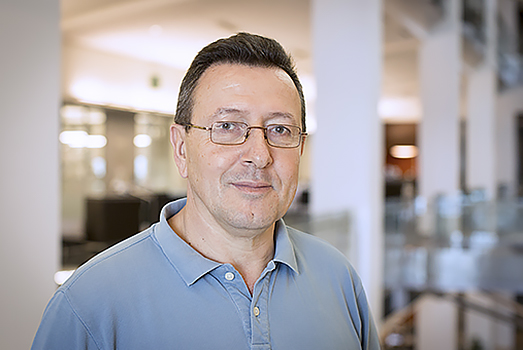Professor Carlos M. Duarte wins EGU medal

Professor Carlos Duarte, the Tarek Ahmed Juffali Research Chair in Red Sea Ecology, was recently honored.
The European Geosciences Union (EGU) recently honored KAUST Professor of Marine Science Carlos M. Duarte with the award of the 2016 Vladimir Ivanovich Vernadsky Medal. The medal was established by EGU's Division on Biogeosciences in recognition of the scientific achievements of Vladimir Ivanovich Vernadsky, a Russian and Ukrainian scientist considered to be one of the founders of biogeochemistry, geochemistry and radiogeology. The medal is awarded to scientists in honor of their outstanding contributions to the biogeosciences.
Duarte is the Tarek Ahmed Juffali Research Chair in Red Sea Ecology in the University's Biological and Environmental Science and Engineering (BESE) division.
Frontiers Science Hero: Carlos M. Duarte from Frontiers on Vimeo.
"The Vernadsky medal is a well-deserved honor for Carlos,” said Pierre Magistretti, dean of BESE. “Carlos is not only a leading figure and a pioneer working at the interface of sustainability and global change in aquatic ecosystems, but is also a tireless teacher, mentor and individual who commits tremendous efforts towards scientific outreach."
Former Vernadsky Medal winners include world-famous climate researcher Claude Lorius for his insights about trapped air in ice core samples, which are central to our understanding of ancient climatic conditions, and Donald Canfield, a member of the U.S. National Academy of Sciences.
Duarte is among 49 individuals who will receive Union Medals and Awards, Division Medals and Division Outstanding Young Scientists Awards from the EGU in 2016. Duarte will be honored alongside recipients from European and non-European countries at the EGU 2016 General Assembly, which will take place in Vienna from April 17 to 22, 2016.
“Receiving the Vernadsky medal is a great honor, as these are awarded by colleagues and provide evidence of the esteem my colleagues have for my research contributions and my scholarship, which they are the best qualified to judge," said Duarte.
Duarte's research focuses on understanding the impacts of global change in marine ecosystems from microbes to megafauna. His research is poised at the interface between Earth and sustainability science, and is increasingly comprised of interdisciplinary components. Duarte's inquiry involves both the metabolic and elemental budgets of marine ecosystems and their connectivity in space, as well as the stability and dynamics of marine habitats and the maintenance of biodiversity, including demographics, space occupation and gene flow.
-By Nicholas Demille, KAUST News.

